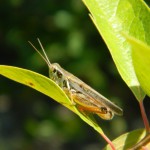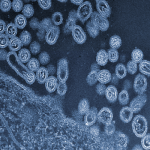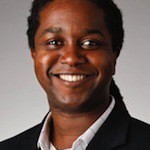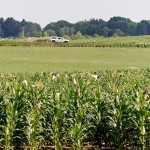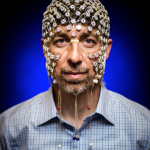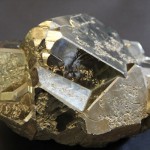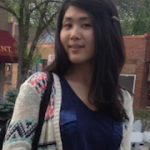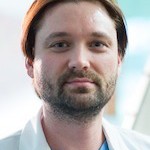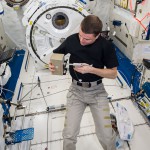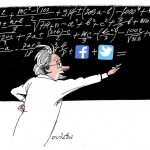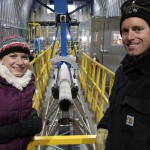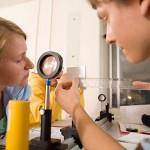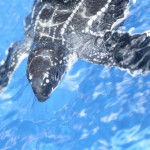Tag Research
Office of the Vice Chancellor for Research and Graduate Education (VCRGE) New Leadership Structure: Frequently Asked Questions (FAQ)
This FAQ has been developed by the Office of the Vice Chancellor for Research and Graduate Education (VCRGE) to answer questions regarding the reorganization and to provide an update on the progress that has occurred to date.
Grasshoppers signal slow recovery of post-agricultural woodlands, study finds
New research by Philip Hahn and John Orrock at the University of Wisconsin–Madison on the recovery of South Carolina longleaf pine woodlands once used for cropland shows just how long lasting the legacy of agriculture can be in the recovery of natural places. By comparing grasshoppers found at woodland sites once used for agriculture to similar sites never disturbed by farming, Hahn and Orrock show that despite decades of recovery, the numbers and types of species found in each differ.
AAAS honors four UW–Madison professors for advancing science
Four members of the University of Wisconsin–Madison faculty have been elected fellows of the American Association for the Advancement of Science (AAAS), the society announced today.
Satellite history at UW–Madison comes full circle with award
Michael Pavolonis thinks of himself as a volcano guy.
Halting the hijacker: Cellular targets to thwart influenza virus infection
The influenza virus, like all viruses, is a hijacker. It quietly slips its way inside cells, steals the machinery inside to make more copies of itself, and then - having multiplied - bursts out of the cell to find others to infect.
Religious denominations friendly to same-sex marriage may protect gay youth from depression
Religious affiliation is generally a source of support, fostering resilience during difficult times. But religion doesn’t exactly have a reputation as a refuge for young gay people. That reputation may change for the better with new findings from researchers at the University of Wisconsin–Madison, Wilfrid Laurier University in Waterloo, Ontario, and Sungkyunkwan University in Seoul, South Korea.
Crops play a major role in the annual CO2 cycle increase
In a study published Wednesday, Nov. 19, in Nature, scientists at Boston University, the University of New Hampshire, the University of Michigan, the University of Minnesota, the University of Wisconsin–Madison and McGill University show that a steep rise in the productivity of crops grown for food accounts for as much as 25 percent of the increase in this carbon dioxide (CO2) seasonality.
Imagination, reality flow in opposite directions in the brain
As real as that daydream may seem, its path through your brain runs opposite reality. Aiming to discern discrete neural circuits, researchers at the University of Wisconsin–Madison have tracked electrical activity in the brains of people who alternately imagined scenes or watched videos.
Scientists get to the heart of fool’s gold as a solar material
As the installation of photovoltaic solar cells continues to accelerate, scientists are looking for inexpensive materials beyond the traditional silicon that can efficiently convert sunlight into electricity.
Violent television may make children more susceptible to advertising messages
A study by a University of Wisconsin–Madison journalism researcher has found that children who watch television shows with action or violence are more susceptible to messages in the advertisements shown during the programs.
Morgridge scientists find way to ‘keep the lights on’ for cell self-renewal
One remarkable quality of pluripotent stem cells is they are immortal in the lab, able to divide and grow indefinitely under the right conditions. It turns out this ability also may exist further down the development path, with the workhorse progenitor cells responsible for creating specific tissues.
UW team’s plants return to Earth after growing in space
Researchers at Simon Gilroy's lab in the Department of Botany at the University of Wisconsin–Madison expect to greet a truck this afternoon that is carrying small containers holding more than 1,000 frozen plants that germinated and grew aboard the International Space Station.
Search committee seeks team builder as next Graduate School dean
The search for the next dean of the University of Wisconsin–Madison’s Graduate School is officially underway.
UW-Madison scientist receives award to save babies, a diaper at a time
She woke up in her hospital room feeling nothing short of desperation. Katie Brenner remembered giving birth to a tiny daughter hours earlier but the doctors and nurses had whisked the preterm infant away for care. She hadn’t seen little Ruthie since. “I want to meet my daughter,” the normally polite Brenner demanded of the hospital staff. Her little girl is now a healthy 6-year-old and for that, Brenner is thankful. But she knows the story ends much differently for too many families. Doing something about it has inspired her scientific career.
They know the drill: UW leads the league in boring through ice sheets
Hollow coring drills designed and managed by UW–Madison’s Ice Drilling Design and Operations (IDDO) program are used to extract ice cores that can analyze the past atmosphere. Shaun Marcott, an assistant professor of geoscience at UW–Madison, was the first author of a paper published today in the journal Nature documenting carbon dioxide in the atmosphere between 23,000 and 9,000 years ago, based on data from an 11,000-foot hole in Antarctica.
Report, experts analyze surging STEM activity at UW–Madison
A recent report on instructional activity in STEM (science, technology, engineering and math) disciplines at the University of Wisconsin–Madison shows significant advances in enrollment and degrees since 2000, which campus experts attribute to a number of factors, including job placement, greater career opportunities and enhanced teaching methods.
Plump turtles swim better: First models of swimming animals
For the first time, researchers at the University of Wisconsin–Madison, Florida Atlantic University (FAU), and the National Oceanic and Atmospheric Administration (NOAA) have measured the forces that act on a swimming animal and the energy the animal must expend to move through the water.

